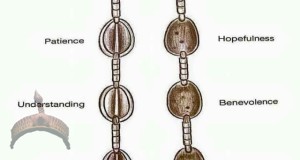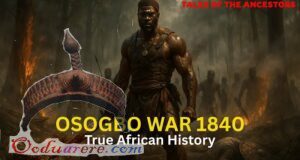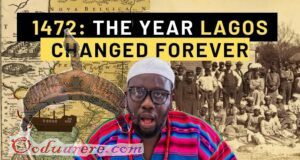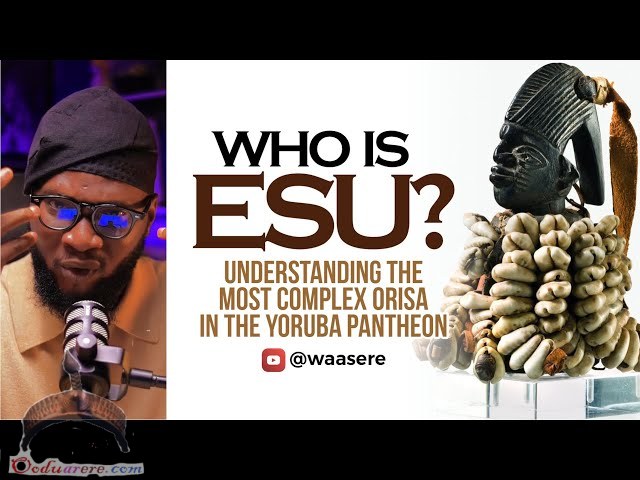The thalamus is nearby the pineal gland and receives nervous afferences from her. It is the focal point that separate the pineal Esu (Esu Odara) fro the personal Esu (Esu Bara). Esu Bara resides in our spine up to the thalamus. He has the form of a snake and may be identified with energies that have been described as “kundalini”. Esu Bara represents our most ancient instinct to survival and shapes our reactions in front of the challenges of the external environment, defining what is ibi and what is ire under the influence of the dominating Odu of that particular moment of the individual life. What direction Esu Bara is going through may be understood from several physical and psychological signs whose complex represents the direction of the Esu force. The interaction of Esu Bara with Esu Odara defines the direction and the quality of our spiritual communication.
This interaction realizes from a symbolic point of view in the very center of the Opon, the cross road where Esu is the gatekeeper of all our lines of communication to ourselves, to other Ori, to Spirits.
In fact Esu is a part of Ori, as expressed by the following definition of Ori: The Yoruba see Ori as destiny but they also see Ori as a personality soul that is capable of ruling, controlling and guiding the life and activities of human beings. Generally, a fortunate person is called ‘Olori-ire’ or “Olori rere” (one who possess good Ori) while one who is unfortunate in life is described as ‘Olori-buruku’ (one who possesses a bad Ori). In this sense one of the meaning of Ori is mind.
In fact Ori can be considered either as Apari-inu (character) and Ori-apere (destiny).
Apari inu. Inu is composed from the word Apa or “signal” and Orí inu meaning “sign of the inner self”. This is a reference to the internal arrangement with respect to the process of building the teachings of Ifa about Iwa Pele. Some Orí enter the world with a provision of development of Iwa Pele while some Ori come unable to easily grasp the importance of the development of Iwa Pele. Those who can open the source to build Iwa Pele through their own internal resources develop what is called “Eri-Okan” meaning “witnessing the heart”. In the language of Ifa witnessing the heart is having a good conscience. Here the heart is put in a central position. As we will see later, the heart may belong to both Ori Apere and Apari Inu. So Okan seems to represent a bifurcational point that is a site that belongs to Esu.
Ori-apere is the half that consists of destiny, and it is made of three elements: a-kun-le-yan (choice), a-kun-le-gba (freewill) and a-yan-mo-ipin (destiny).
Akunleyan describes the choices at the feet of Olodumare (the experiences on Earth), Akunlegba is the free will and Legba is an important constituent of this word indicating the role of Esu in guiding the free will of human beings, Ayanmo is the unchangeable destiny (one’s family for example).
Staying over akunlegba, we see the importance of Legba in determining the concept of free will. This is a quite important point as defines the non-unchangeability of the human destiny. People whom come to Earth with Ori buruku due to the primal choice in Orun, still have the possibility to repair their Ori and to change their destiny. Legba is the main effector of this possible change. Legba is Esu. But this word may have also the meaning of le and gba, the power of saving. While akun means “who adds”, the entire word akunlegba may mean “who adds Esu”, or “who adds the power of saving”. So, Legba is indicated as the Being who has the power to save. As to go to the path of saving is to go to the path of Iwa Pele, the meaning of akunlegba appears intimately connected to Eri Okan, witnessing the heart. So, again the heart is put in a central position.
We should be aware that, as the heart is a bifurcational point between ori Apere and Apari Inu, that is between destiny and character, this observation makes clear Esu is who can realize the transition of destiny to character and of character to destiny. I think this is the clearer definition of free will in Yoruba terms one can find out. It seems so appropriate to define the presence of Ori Okan, that is the part of Ori where one can realize the alignment between character and destiny. In Yoruba philosophy Okan, is not only the muscle organ that makes the blood circulate.
Continue after the page break.
 Ọmọ Oòduà Naija Gist | News From Nigeria | Entertainment gist Nigeria|Networking|News.. Visit for Nigeria breaking news , Nigerian Movies , Naija music , Jobs In Nigeria , Naija News , Nollywood, Gist and more
Ọmọ Oòduà Naija Gist | News From Nigeria | Entertainment gist Nigeria|Networking|News.. Visit for Nigeria breaking news , Nigerian Movies , Naija music , Jobs In Nigeria , Naija News , Nollywood, Gist and more









